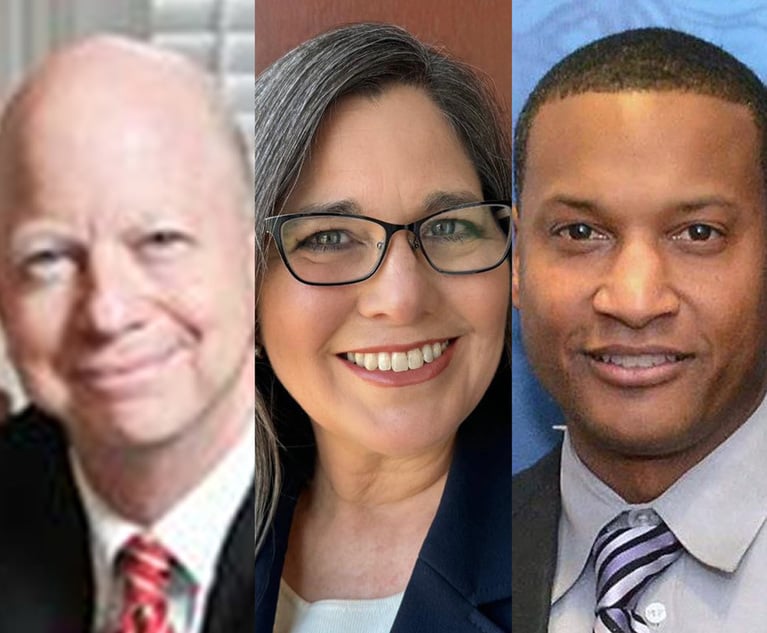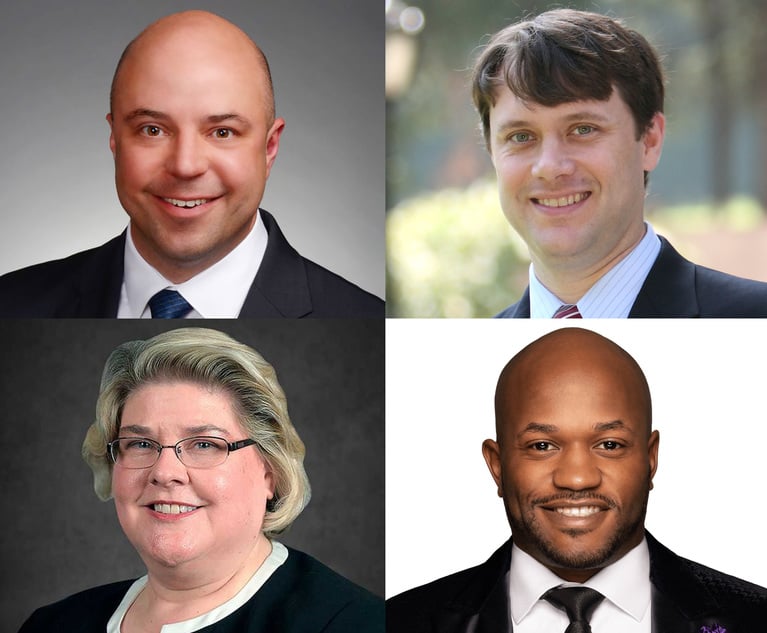 Justice Stephen Breyer, U.S. Supreme Court. (Courtesy photo)
Justice Stephen Breyer, U.S. Supreme Court. (Courtesy photo)11th Circuit Gets No New Guidance From SCOTUS on Grand Jury Secrecy
Grand jury transcripts from the investigation into the 1946 Moore's Ford Bridge lynching are at stake.
January 28, 2020 at 03:45 PM
5 minute read
The federal appeals court in Atlanta will decide whether district court judges have inherent power to order the disclosure of grand jury materials without new guidance from the U.S. Supreme Court, which last week turned away a chance to rule in a similar case.
The justices on Jan. 21 let stand a ruling by the U.S. Court of Appeals for the D.C. Circuit that said judges don't carry that authority. The justices' inaction means lower court precedents will remain conflicted on the issue.
The full Eleventh Circuit is weighing a case of a historian's efforts to examine records from the grand jury that investigated the 1946 lynching of two African American couples at the Moore's Ford Bridge in Walton County, Georgia. The killings are considered one of the precursors to the civil rights movement.
Judge Marc Treadwell of the U.S. District Court for the Middle District of Georgia in 2017 ordered the release of the Moore's Ford grand jury transcript, but the U.S. Justice Department appealed.
Last year, an Eleventh Circuit panel split 2-1 to uphold Treadwell's ruling, based in part on a 1984 precedent known as Hastings, 735 F.2d 1261. The panel allowed the release of grand jury records in an "exceptional situation"—the indictment of then-District Judge Alcee Hastings of Miami. Courts have also released grand jury transcripts in historically significant cases, including those involving Julius and Ethel Rosenberg, President Richard Nixon and union leader Jimmy Hoffa.
One of the two judges in last year's majority, Adalberto Jordan, noted he was bound by precedent but was concerned its holding over a judge's power to release grand jury records was "too open-ended." The full Eleventh Circuit voted to reconsider the case and last October heard arguments over whether the court should scrap the Hastings precedent.
As the Eleventh Circuit pondered its decision, the Supreme Court shied away from the question last week, with only Justice Stephen Breyer offering his thoughts on the matter. He wrote that the D.C. Circuit's ruling "is in conflict with the decisions of several other Circuits, which have indicated that district courts retain inherent authority to release grand jury material in other appropriate cases."
"Whether district courts retain authority to release grand jury material outside those situations specifically enumerated" in the federal judicial rules "is an important question," Breyer added. He urged the federal judicial rules committee to revisit the question.
Ashwin Phatak of the Constitutional Accountability Center, which in an amicus brief backed the historians seeking unsealed grand jury materials in the Eleventh Circuit and the high court cases, said it was disappointing that the justices declined to hear the case. "[T]he text and history of the Federal Rules make clear that district courts have the inherent authority to disclose historically significant grand jury materials," he said.
A denial of certiorari "is not a ruling on the merits," he added, arguing the Eleventh Circuit need not wait to see whether the judicial rules advisory committee takes up Justice Breyer's suggestion that it clarify its position.
"The Advisory Committee has consistently stated for decades that district courts have this authority, as have numerous courts," he said.
David Karp of Carlton Fields in Miami, who represents a historian and a foundation pushing for the records to be unsealed in the Georgia case, said Breyer's comment "reinforces our argument that the Rules Committee already recognizes the inherent power of federal courts to release grand jury material in cases of exceptional historical importance."
"We were also heartened to see Justice Breyer recognize that this issue presents an important question," added Karp. "The process of confronting our nation's past is vital to democracy and to progress. Federal courts can and should further these values, rooted in the First Amendment, by exercising sound discretion to release grand jury records in appropriate cases of exceptional historical importance."
A lawyer for the Department of Justice did not respond to a request for comment.
Joseph Bell, a New Jersey lawyer who represents the historian in the Eleventh Circuit case, echoed those who said the judicial rules committee already allows judges to unseal grand jury information in extraordinary cases.
During the Eleventh Circuit argument, one judge told Bell that, if he lost the case, the records could still come via the Civil Rights Cold Case Records Collection Act of 2018, which allows a review board to authorize the release of records from cases like the Moore's Ford lynching.
Bell noted this week that the new law gives veto authority to the U.S. attorney general, so "I may never get the transcripts."
Mike Scarcella of ALM's Supreme Court Brief contributed to this report.
|This content has been archived. It is available through our partners, LexisNexis® and Bloomberg Law.
To view this content, please continue to their sites.
Not a Lexis Subscriber?
Subscribe Now
Not a Bloomberg Law Subscriber?
Subscribe Now
NOT FOR REPRINT
© 2024 ALM Global, LLC, All Rights Reserved. Request academic re-use from www.copyright.com. All other uses, submit a request to [email protected]. For more information visit Asset & Logo Licensing.
You Might Like
View All

Who Got the Work: 16 Lawyers Appointed to BioLab Class Action Litigation
4 minute read

'Possible Harm'?: Winston & Strawn Will Appeal Unfavorable Ruling in NASCAR Antitrust Lawsuit
3 minute readLaw Firms Mentioned
Trending Stories
Who Got The Work
Michael G. Bongiorno, Andrew Scott Dulberg and Elizabeth E. Driscoll from Wilmer Cutler Pickering Hale and Dorr have stepped in to represent Symbotic Inc., an A.I.-enabled technology platform that focuses on increasing supply chain efficiency, and other defendants in a pending shareholder derivative lawsuit. The case, filed Oct. 2 in Massachusetts District Court by the Brown Law Firm on behalf of Stephen Austen, accuses certain officers and directors of misleading investors in regard to Symbotic's potential for margin growth by failing to disclose that the company was not equipped to timely deploy its systems or manage expenses through project delays. The case, assigned to U.S. District Judge Nathaniel M. Gorton, is 1:24-cv-12522, Austen v. Cohen et al.
Who Got The Work
Edmund Polubinski and Marie Killmond of Davis Polk & Wardwell have entered appearances for data platform software development company MongoDB and other defendants in a pending shareholder derivative lawsuit. The action, filed Oct. 7 in New York Southern District Court by the Brown Law Firm, accuses the company's directors and/or officers of falsely expressing confidence in the company’s restructuring of its sales incentive plan and downplaying the severity of decreases in its upfront commitments. The case is 1:24-cv-07594, Roy v. Ittycheria et al.
Who Got The Work
Amy O. Bruchs and Kurt F. Ellison of Michael Best & Friedrich have entered appearances for Epic Systems Corp. in a pending employment discrimination lawsuit. The suit was filed Sept. 7 in Wisconsin Western District Court by Levine Eisberner LLC and Siri & Glimstad on behalf of a project manager who claims that he was wrongfully terminated after applying for a religious exemption to the defendant's COVID-19 vaccine mandate. The case, assigned to U.S. Magistrate Judge Anita Marie Boor, is 3:24-cv-00630, Secker, Nathan v. Epic Systems Corporation.
Who Got The Work
David X. Sullivan, Thomas J. Finn and Gregory A. Hall from McCarter & English have entered appearances for Sunrun Installation Services in a pending civil rights lawsuit. The complaint was filed Sept. 4 in Connecticut District Court by attorney Robert M. Berke on behalf of former employee George Edward Steins, who was arrested and charged with employing an unregistered home improvement salesperson. The complaint alleges that had Sunrun informed the Connecticut Department of Consumer Protection that the plaintiff's employment had ended in 2017 and that he no longer held Sunrun's home improvement contractor license, he would not have been hit with charges, which were dismissed in May 2024. The case, assigned to U.S. District Judge Jeffrey A. Meyer, is 3:24-cv-01423, Steins v. Sunrun, Inc. et al.
Who Got The Work
Greenberg Traurig shareholder Joshua L. Raskin has entered an appearance for boohoo.com UK Ltd. in a pending patent infringement lawsuit. The suit, filed Sept. 3 in Texas Eastern District Court by Rozier Hardt McDonough on behalf of Alto Dynamics, asserts five patents related to an online shopping platform. The case, assigned to U.S. District Judge Rodney Gilstrap, is 2:24-cv-00719, Alto Dynamics, LLC v. boohoo.com UK Limited.
Featured Firms
Law Offices of Gary Martin Hays & Associates, P.C.
(470) 294-1674
Law Offices of Mark E. Salomone
(857) 444-6468
Smith & Hassler
(713) 739-1250






